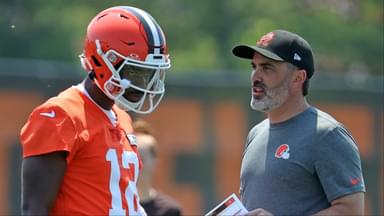Despite having made a career out of being a naysayer, Skip Bayless maintains that there is a right way and a wrong way to go about criticizing athletes. In a digital world where making hateful comments can seem like a trendy method for generating engagement, the controversial media personality encouraged athletes to step away from the screens.
Advertisement
On the latest episode The Skip Bayless Show, the Fox Sports commentator elected to dedicate his closing segment to cyber bullying in sports. Citing various examples, such as Juju Watkins’ knee injury and the death threats that have been directed towards the Mississippi State roster, Bayless highlighted that it’s all the athletes’ fault.
Asserting that players feel the need to check their social media mentions “…because they badly need the validation,” Bayless has little to no sympathy for those who chose to indulge in the cesspool of online comments. Going as far as to remind them that such validations would not mean much as they are coming “nobodies,” he implored athletes to reassess their priorities moving forward.
“Now I’m even seeing a public service commercial on television, during games, pleading with angry gambles to please don’t take it out on the players via social media. And, I keep thinking, I just don’t get it. If a kid gets bullied at school, it’s tough because obviously the kid needs to go to school… No player has to read the comments directed at him or her on social media. It’s not a requirement. It’s an addiction.”
In a mocking yet honest tone, Bayless advised that more players should follow in his footsteps and simply “quit reading that garbage.” Citing his own experiences of having received more than his fair share of death threats, the longstanding feature of Fox Sports explained:
“They run to the media and cry about how we have no idea what they have to put up with on social media. No, I don’t have any idea, not anymore. I quit putting up with it about 13 years ago. Hey, I’m ‘the most hated man sports in media.’ I’m pretty sure I’ve received more death threats, since joining Twitter in 2009, than any other person in sports media.”
Having dealt with it first hand, Bayless maintains that such comments are merely noise and nothing else to him. While the interactions are certainly good for his business, he made it clear that they are not to influence one’s mental health.
Bayless suggests that his understanding is a very real yet simple one. “I don’t need the positive reinforcement, and I do not need the negativity.” At 73 years of age, the broadcaster seems to be doing his best to impart some wisdom to the next generation, albeit with a calloused slant.
“I hit social media bottom just before the 2012 NBA Finals… In those days, I did try to read everything that was said about me and about the show because I thought it’d help me choose the hottest topics for the show… I started getting death threats on my Twitter feed… I passed a number of them along to ESPN security… They provided for me, a bodyguard, 24/7… After that experience, I said no more, never again.”
Since then, Bayless claims that he has never returned to the comment section of his various social media pages. Now on the other side of the same experience that many young athletes are just beginning to endure today, the harshness of Balyess’ message should not outweigh its validity.
Social media comments from strangers who you are likely to never meet are nothing more than letters and symbols in the digital ether. Do not let them impact your real-world experience, otherwise, you may find yourself consumed by negativity despite living what is otherwise a wonderful life.







